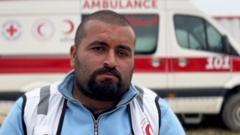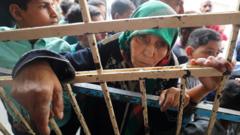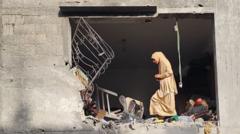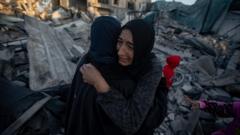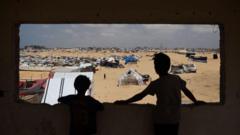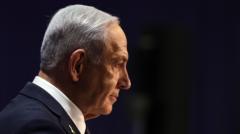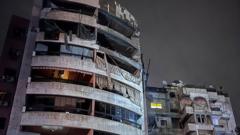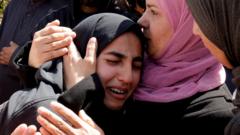In an emotional recount, paramedic Munther Abed describes how he survived an Israeli military strike that killed 15 of his colleagues in Gaza. He disputes the Israeli military's claims of their vehicles posing a threat, emphasizing their role as humanitarian workers. As calls for accountability grow, the aftermath of the attack raises significant concerns for the safety of medics in conflict zones.
Paramedic Survivor Challenges Israel's Narrative on Fatal Gaza Attack
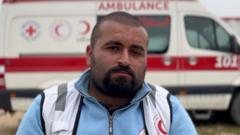
Paramedic Survivor Challenges Israel's Narrative on Fatal Gaza Attack
Munther Abed, the sole survivor of a deadly Israeli strike on paramedics in Gaza, contests the official account of the incident, revealing harrowing details of the attack that left 15 emergency workers dead.
Paramedic Munther Abed survived a deadly attack that left 15 emergency workers dead by diving to the floor inside the back of his ambulance. Abed asserts he is the only survivor who witnessed the events unfold, scrolling through pictures of his fallen colleagues on his phone. “I was pulled from the wreckage by Israeli soldiers, arrested, and interrogated for over 15 hours,” he tells a BBC journalist, recounting the harrowing early morning incident of March 23.
Abed details how his team, consisting of the Palestinian Red Crescent, Gaza's Civil Defence agency, and the UN agency for Palestinian refugees (Unrwa), had gathered in Rafah after responding to reports of gunfire. He notes that emergency vehicles had their lights on during the operation. “All lights were on until we came under direct fire,” he said, refuting the Israeli military's claims that they acted under suspicion due to the vehicles approaching without prior coordination and with their lights off.
Israel's Foreign Minister, Gideon Saar, maintains that the military did not target an ambulance but rather opened fire on suspicious vehicles, claiming the attack killed a Hamas operative along with other militants. However, the names of the dead emergency workers—including eight from the Red Crescent—do not match those linked to Hamas based on the official list.
Abed strongly rejects claims by Israeli officials that Hamas used ambulances as cover, stating firmly, “All crews are civilian” dedicated to saving lives. The grief over the attack reverberated throughout Gaza, with many mourning the loss of their colleagues. “He was killed in cold blood,” sobbed the father of paramedic Ashraf Abu Labda, killed in the strike.
The bodies of the fallen workers were discovered buried in sand a week after the attack, prompting demands for accountability. Sam Rose, acting director of Unrwa’s Gaza office, emphasized the need for a complete investigation. The lack of commitment from Israel to carry out such an inquiry adds to the ongoing turmoil faced by healthcare workers in the region.
Among the casualties, one paramedic remains unaccounted for, prompting Abed to reflect on the camaraderie shared with his colleagues. “They were my second family,” he said, vowing to expose the atrocities suffered by his team. “If I was not the only survivor, who would have told the world what they did to our colleagues?” The implications of the attack continue to raise alarms regarding the safety and rights of medics and humanitarian workers in conflict zones.


